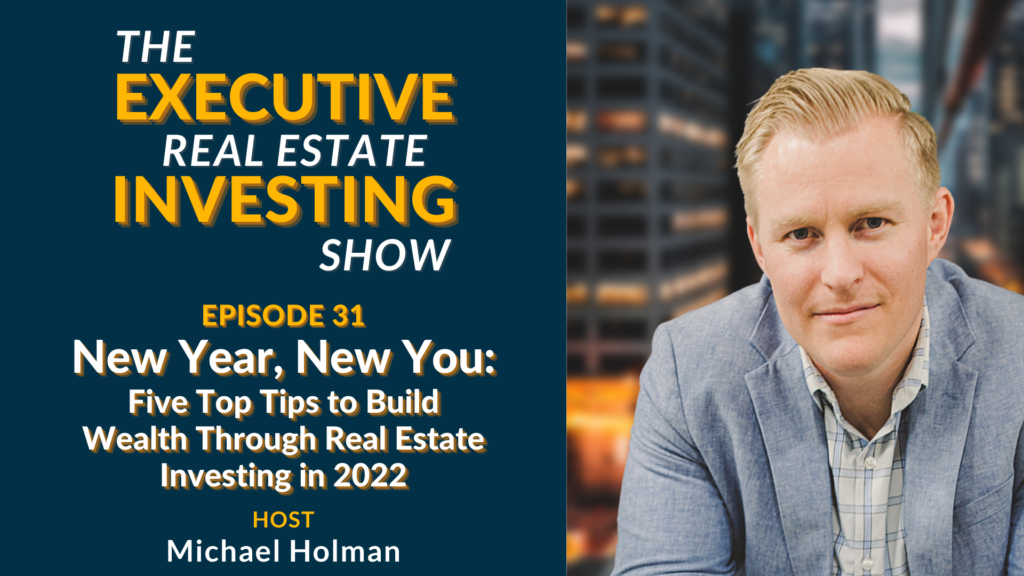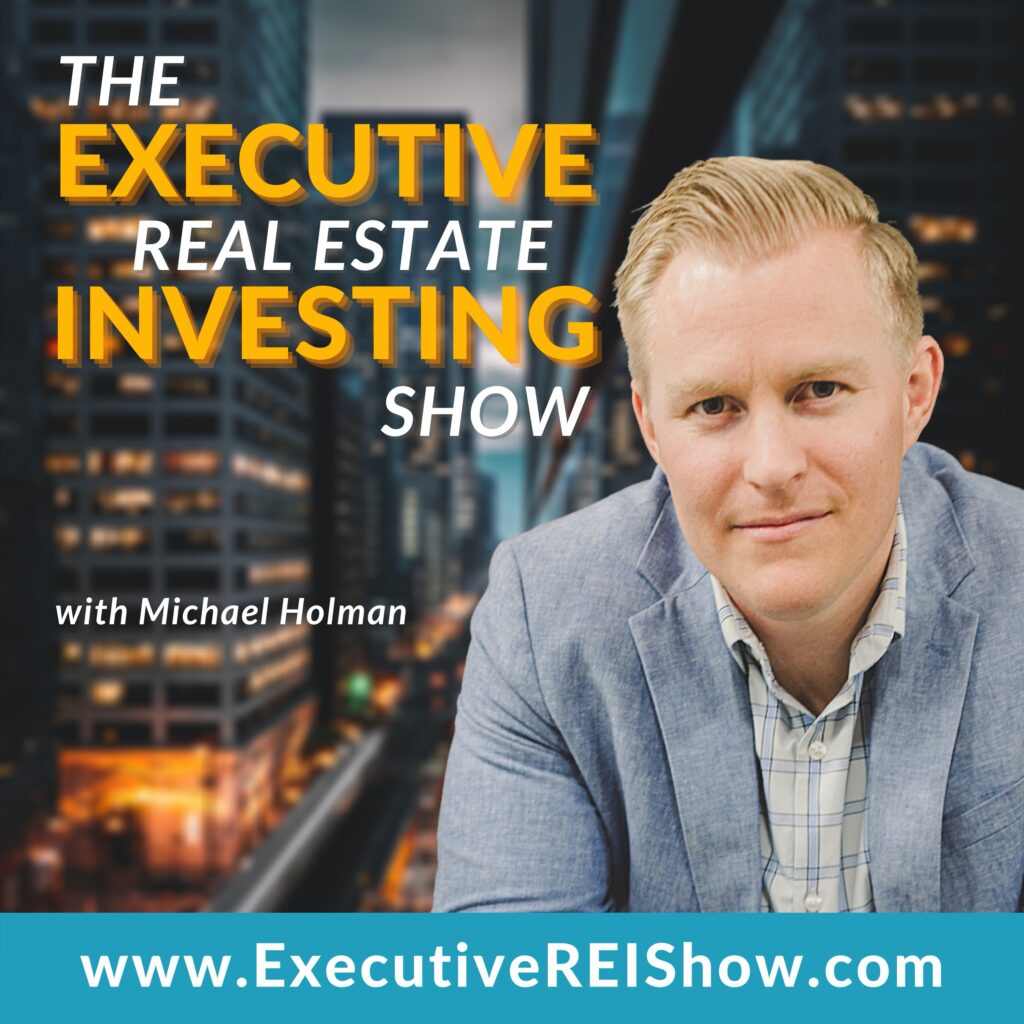
The executive Real estate investing Show
EPISODE 31
New Year, New You: Five Top Tips to Build Wealth Through Real Estate Investing in 2022 with Michael Holman
- January 3, 2022
EPISODE SUMMARY
Whether you’re a seasoned real estate investor, or you’re just getting started on your real estate investing journey, host Michael Holman pulls together five tips that will benefit everyone going into 2022.
Michael talks about getting motivated to get started in real estate investing, a few of the tax advantages to real estate, why it’s important to be flexible in the coming years, finding trustworthy sponsors, and not letting fear overtake you.
Listen now as Michael gives five powerhouse tips for the real estate investor for 2022.
EXECUTIVE TIP
Keep It Simple
LISTEN TO THE PODCAST HERE

The Executive Real Estate Investing Show Podcast
EP 31: New Year, New You: Five Top Tips to Build Wealth Through Real Estate Investing in 2022 with Michael Holman
Listen on
READ THE TRANSCRIPT HERE
Note: Audio transcription has been automatically transcribed
Welcome to The Executive Real Estate Investing Show. This podcast is for you, the busy business owner or executive looking to create generational wealth. Here, we’re going to show you how to do that through real estate investing from multifamily to industrial and everything in between. You will become a real estate investing expert. And now, here’s your host, Michael Holman.
Michael Holman: Hello everyone and welcome to another episode of The Executive Real Estate Investing Show. I’m your host, Michael Holman, super excited to have you with us today. Super excited about the brand-new year 2022. Rolling in 2021 was fantastic. Amazing. A lot of great things happen.
Here’s to hoping it’s even better for everyone. So I hope everyone had a good holiday season. I hope new year’s was great. I hope everyone’s got their goals set and ready to go and pushing forward. And today we got a very special episode because you want to know what I am going to go through five real estate investing tips to help you in your investing journey in 2022. So really, really excited about this one. If you haven’t subscribed yet, go ahead, go to the subscribe button, hit that subscribe button we want to hear from you. Right? And so also leave us a rating leave us a review. We love to get those all the time. And lastly, www.ExecutiveREIshow.com it’s amazing. There are tons of good content on. You can download the newsletter. You can ask executive questions. Those are the questions that I answer about once a month, once every other month on a special episode. So you can get your questions answered directly by me by submitting those questions.
Really, really fun to do that. So www.ExecutiveREIshow.com and as always, we’re going to start off today with an executive tip and today’s executive. Is keep it simple, right? Sometimes we make things out to be so much more difficult, so much more complex than what they actually are or what they actually need to be.
And real estate investing in the broad term is a simple process, right? And honestly, most businesses, most everything that we do can be broken down into various very simple processes. And with that, I’m going to keep this executive tip simple and get right in to these five tips for kicking off your 2022 investing journey.
Let’s get into it. Hello everyone, this is Michael Holman. I just got to take a quick moment and tell everyone about this exciting, exciting news that we have coming up here at The Executive Real Estate Investing Show. And at my company, Overland Group, Inc. We are in process of creating one of the most mind-blowing real estate trend analysis reports that has ever been created. Right. And it’s going to draw on all sorts of reports. It’s going to take my knowledge and again, we’re going to give it away. Absolutely. To you, to your friends, to your grandma, to anybody who wants it. It’s coming out in the next couple months, be on the lookout, right?
It’s going to be at www.overlandgroupinc.com and www.overlandcapitalcorp.com
You can find it on both places. I’ll even have a link to it from the www.ExecutiveREIshow.com. But this is going to be amazing. It’s going to give you so much information on where we’re at in the real estate. And where things look to be going in 2022. And like I said, that’s coming out and going to be rolling out over the next couple months, be on the lookout.
I’m going to give you more updates, but I just want to make sure that, you know, it’s coming and we’re excited to give it to you. Thanks everyone. Getting right in to our five tips for the day. Tip number one, the only way. To get in the game is get off the sideline. All right. I kind of have to laugh because this is the most common theme.
I mean, every single time I bring a guest onto the show, I asked them two questions. And that second question, what real estate investing advice would you give other business owners and other executives and time and time and time again, they say the same thing. Sometimes they say it in different ways, but they often say the same.
And that’s take action, right? That’s getting the game. You cannot benefit from real estate investing if you’re not doing it right. You have to find a way to get into the game, get off of the sidelines. Right? You’re not going to know. Everything, when you try and get started, you’re just not right. I mean, I openly admit I’ve been doing this for quite a number of years.
Right. And I’ve done hundreds of millions of development and transactions. And I readily admit that I still don’t know everything. I mean, there’s a lot of things that I still have to learn. And, but guess what it does stop me from doing it. It doesn’t stop me from continuing to invest and from continuing to try and fill my financial dreams and goals.
And you can too right. The biggest thing to understand with all of this right, is you have to just get started and there’s a myriad of ways to get started. Right. But you have to find your way and how you’re going to do it. So tip number one. For the new year, get in the game, right? Get off the sideline and get in the game and find a way to do it and keep listening.
Cause we’re going to help you explore different ways to get in the game if you are already. But we’re going to have some future episodes that are going to do that. Tip number two and this is a big one that I don’t necessarily focus on a lot or as much as I feel like I should. Right. And that is, you need to take some time to understand the tax advantages of real estate, right?
I mean, and it’s funny that I say I don’t take as much time talking about this as I should. You know I’m a CPA by trade. That’s what I did prior to real estate. But it’s true you have to take some time to understand the tax benefits and my one disclaimer. Right. I’m going to talk about some things here.
Talk to your CPA or talk to your tax attorney, whoever you got to before you make any decisions. But that being said. Right. Real estate investing really is more than just the return that you see, right? Everybody posts a return, all these sponsors, right. 15% IRR, 16, 20, you know, whatever they have.
Well, that’s great. But the thing to understand is that return doesn’t necessarily incorporate the tax benefits that you personally are going to receive. I mean, just think about it. Tax is the number one biggest expense in most of our lives, right? I mean, Anywhere between 10, 15 to 30, 40% of your annual income.
I mean, let’s just take 30% of your annual income, right? You make $200,000 a year. That means that the government is taking $60,000 a year using that example. And that all depends on, you know, everything that’s going on in your life, but 60,000. Great. That is generally the number one single largest expense or detractor of net worth and net worth building of anything in our lives.
Right. And so you have got to take some time and understand these tax benefits. And I want to go through just a couple, right? The tax benefits of, of investing in real estate is that depreciation versus cashflow, right? The beautiful part you can have in real estate. Thanks to depreciation. Thanks to interest all these different things.
You can have potentially a net income or at least a lower net income and still be getting cash. Right? So when you go to report your taxes, you get a document from a CPA that says, yeah, we lost money. This year. Don’t have to pay any taxes. If you lose money. Well guess what cash is still going into your bank account.
All right. What could be better than that? Right? I mean, it’s, it’s tax-free money essentially. And like I said, I’m taking it to the extremes. It doesn’t always work like this. It does not always end up that you’re negative on one side and positive on your cashflow, right? Like that doesn’t always happen, but it happens a lot, right?
In general, your net income or what you report to the IRS is almost always lower than what your cash is that you get because you have these non-cash expenses. That the IRS says, yeah, that’s an expense that counts against your net income and what you have to pay in taxes. Right. But it’s a non-cash expense, really, really cool stuff in real estate investing that you don’t necessarily get in a lot of other industries.
Okay. A couple of other tax benefits and things to just look at. That is 1031 exchanges, right? I mean, if you’re interested in taking your 1031 exchange and investing in it to a syndication, then I highly recommend go back, listen to episode 14 and watch episode 14, go, go to YouTube and watch it.
Cause I actually draw out exactly what has to happen for that to happen. But 1031 exchanges, right? If you have a property and your you’re coming out of that property, you sell it. You buy another tax-free, you can literally build a small fortune over a number of years, deferring taxes, time and time and time again.
And this is a hot topic. I mean, this is something that everybody’s been talking about. Everybody’s been wondering, you know, is our 1031 exchange is going to go away eventually or not go away. The answer that I have is, I don’t know. Right? It’s extreme. Could they? Yes. Are they going to probably not.
I really don’t think anything’s going to change in the immediate future. You know, I don’t have a crystal ball, but 1031 exchanges can be huge wealth builders. Right. And depending on the type of investment, and the type of real estate that you have, those could be really beneficial. But like I said, I just want to reiterate, if you were interested in investing your 1031 exchange money into a syndication, go back, watch episode 14, teach you how to do it.
I’m going to give you all the tips there. And because it’s honestly, it’s a little messy, it’s a little more complex and a lot of sponsors just don’t do it. They just find out, you know? Yeah. It’s not worth it. Right. I’m not going to do it, but go check that episode out. You’ll understand how that all works.
One of the other tax benefits to talk about is you can invest through a self-directed IRA or 401k. Right? This is another thing that I haven’t talked about a lot, but it’s so powerful. I mean, think of, think of if you had a self-directed Roth IRA, right? You’d already paid the tax. You had, you know, a million dollars sitting in there and you’re thinking I’m ready to make some investments, right?
I want to make some real estate investments. Well, within that, you can make a real estate investment, which has exponentially more potential. And, and over the long history has significantly higher returns than say the stock market. You can invest money into real estate tax. Through that process, right through your self-directed roth IRA or self-directed 401k or whatever self-directed retirement account you have.
That is super powerful, right? I mean, that can make a huge, huge difference already. Haven’t paying taxes. And just getting that wealth building going, right. It’s all about getting that wealth building to build the momentum. And that is a great way to do it and a great way to invest in real estate. Last thing that you want to touch on, you know, there’s, there’s a number of real estate professionals that listen to this show, right?
Real estate agents, brokers, mortgage. Investors, you know, the, that are counted as real estate professionals per the IRS. And it’s an IRS definition. Well, one of the cool things is if you were, if you are a real estate professional, you can potentially charge your passive losses towards active income, right.
Just reducing your tax liability even more. And so all of these things that I’m talking about, right? These are things that don’t necessarily show up in returns. These are things that don’t get highlighted enough about real estate, right? Even people who are freaking out about the stock market. Oh yeah.
2021 was a great year and everything went up and all these good things are happening. Like, yes, I agree. But they’re only looking at one aspect of this investment and that’s, that’s the returns, right? The returns. Yeah. They’re important, but there’s a lot of other benefits to real estate investing. Like these tax benefits that you need to understand.
Right. So that is my second tip for getting 2022 started. Right. And that is take some time, understand the tax advantages of real estate and that. Tip number three, and this, this is probably my most important one. And that is flexibility is going to be key in the coming months and years. Right. And, and people often ask, well, why would I say that?
I’m saying that because you’re going to have to be willing to potentially pivot in 2022, right? I mean, let’s just take a step back product. The U S economy is a boom-and-bust economy. It just is. And even though we’re, even though we’ve inflated it and we’ve done all these things to try and stop it from busting, right.
I don’t know if it’s in one year, 10 years, 20 years, right. It’s going to bust. It always does. And that is the way that the market is set up. And so that might mean that there could be a recession mean. Honest truth. Right. Nobody really wants to talk about it or address it, but could there be a recession in two years?
Yeah. Could there be a recession in one year? Yeah. Well, how is that going to affect real estate investing? And what I have to say is real estate investing has always fared very well now. So all your assets immediately following a market crash, right? And this is where flexibility comes in. You might have to be more flexible on timeframes, right?
Maybe your whole period was estimated to be at five years and you’re supposed to sell in 2022. Well, if a crash were to happen, right, or whatever the case may be. The worst thing you could do is sell it immediately because the market almost always dips and takes a really big dip and then it comes back.
Right? I mean, you can even look at 2008 in 2009. Yeah. It took a huge dip. Everyone’s freaking out 30, 40% loss in value in my real estate. Well, if people just held onto it a couple of years, Right. Even in some of the worst markets, right by 2015, 2016, it was back up where it needed to be. Right. So be flexible, right?
The more flexibility you can show in your real estate investing the better off you’re going to be, to make, to make good decisions, right. Decisions that are going to help you build that net worth even more. You know, it might even include, you might be saying, Hey, I only do you know five-year-olds or three-year-olds or whatever the case may be.
Well, you might want to start looking at some ten-year-olds right. The reason being is because then you’re diversifying some of that risk, right? If you have some assets that are supposed to sell in a short term, you can take and mitigate that risk or spread that risk out by taking some assets and saying, Hey, I’m going to start doing some ten-year-olds.
Yup. That was just one of the points that I’m making here in this section of being flexible. Right? Another thing that a lot of people are approaching, I mean, people are calling me all the time right now. And the reason being is because they feel like buying existing, buying existing real estate doesn’t make sense.
Right? I mean, let’s just take apartments, for example. I mean, people are buying apartments at 400, $500,000 a year. And people are just going, I don’t know how this is making sense, but you know, I, I’m cute. I’m still doing it. Well, maybe now’s the time to look at development, right. Maybe potentially look to pivot into some of the development.
And I, you know, I have a bunch of thoughts on, on getting started in development, but whether it’s you getting started in development, whether it’s you investing with somebody, who’s an expert at doing development, whether it’s you partnering with somebody who does, you know, whatever the case may be. These are the types of things that we need to look like, look to as we’re approaching 2022, because there’s different things happening, right.
If you’ve been investing in it passively and value, add multifamily for five years, and you’ve never done anything else. And you said, that’s the only thing I’m going to do well, great. You know, if you want to keep going on that, that’s fine. But I would recommend just looking at, be flexible, right? I’m not saying change your investment strategy completely, but just understand that.
Precarious market calls for more flexibility and the people who are going to fare best through the next 1, 2, 3, 4, 5, 10, 20 years are those who have the most flexibility in what they’re doing. They don’t have to sell the second to the market crashes to the bottom, right. They don’t have to buy. At the very top, these are the things that are gonna, the institutional level investors are looking at and are understanding, right?
The best investors in the world understand that there’s a time and place for everything, right. And it’s not necessarily what you’re doing as much as it is when you’re doing it, how you’re doing it, right? These are all the important things. And so be flexible as you’re going into 2022, right. That is going to help you immensely.
And one of the most amazing and freeing parts of being flexible, guess what it takes all of this worry and stress of, oh, is a recession going to happen? Oh, is the market going to crash? It almost takes it over. Because if you’re going into things saying I’m flexible, you know, if this needs to be a ten-year-old and I said a five-year-old, you know, but it’s the best thing to do.
If you being flexible, then you can write out whatever market conditions may exist at whatever time. Right. That’s where the flexibility is really powerful. And that’s where it becomes free because one of the. One of the things, right? Like going back to tip number one, one of the most common reasons that I hear people say I’m not going to get invested in real estate.
Well, it’s at the top of the market, right? It’s we’re at the top. We’re at the top. We’re a hundred percent of the top. Well guess what people have been saying that I’ve been hearing that phrase since the beginning of 2016. So here we are, essentially five years later. In 2022 and people are still saying the same thing.
Right? I heard it time and time again. Right. People in my own neighborhood, other real estate investors. We’re at the top of market. I’m not buying why? Because it’s not cheap. Oh, okay. That’s fine. Well, that mindset has paralyzed. Right. Don’t be stuck in there and, and being willing and understanding that there’s flexibility involved in real estate investing, man, that is going to free you up and relax your mind so much to be able to get to. Cause all of a sudden, you don’t have to worry about what’s going to happen in one year, you know? Oh, you know, I’m trying to eat. I got to time the market crash. I got a time when this downturn is going to happen and I got to time it down to the day. Right. It’s like, it’s going to be March 4th, 2025. And that’s why I have to time everything.
You’re not worrying about that. Right. That it gives you the ability to say, you know what? I know really. Is generally goes up, right. And I’m not saying it always goes up, definitely a fallacy, but if you look at the long run, right, just big picture here, real estate goes up. It always has been trending upwards and nobody expects it to, to start trending downwards over an extended period of time.
Is there times when it dips? Absolutely 100% no questions. But if you were to viewer to zoom out big picture, it’s generally going up. So that is why I say number three, be flexible because it is going right. There’s a lot of, there’s a lot of questions that are arising from real estate investors right now.
And the more flexibility you have and can show the better off your going to be tip number four. And this one comes from talking to a little. A lot of real estate investors and real estate sponsors. And that’s do your due diligence on you’re the sponsor, right? I’m just going to I’ve harped on this time and time again.
But I am going to just say it again, cause it’s, it’s probably one of the top, you know, it’s obviously a top five. That’s why it’s in my list, but it is one of the most important things you can do as a passive investor, right. People are always wondering, well, how do I analyze a deal? Well, I always tell them.
Take a step back because if you’re invested in your you’re investing passively, right, you’re putting your money with a sponsor. You can do all your due diligence that you want, but you are never going to be able to do as much due diligence or have as much knowledge as that. So wouldn’t it be better?
Wouldn’t you be better off taking the time to know and understand that sponsor and do your due diligence on the sponsor so that you can feel like you can either trust or not trust everything that he or she is telling you. Right. Do your due. Don’t be afraid to ask the hard questions, right? Ask difficult questions.
I tell people all the time, right? Talk, ask your sponsors. What’s a time that you failed, right? What’d you do? How’d you react? Or what’s, what’s an investment that it’s not performing as well as you want it to. You can ask them the good questions too, but guess what? Real estate investing, isn’t a science and it’s not perfect and no sponsor is perfect.
Right? If you find somebody who claims that they’re perfect, that is completely untrue and telling you stay away from them right now, right? The things don’t always go out. Exactly. As expected. Right? But the most important thing you can do is find a sponsor that you feel that you can trust, right? That their vision aligns with your values and what you want and you can get behind them.
And that is super, super valuable. Right? So the more you spend your time doing your due diligence on sponsors, the better, right. That is going to save you a crazy amount of time and energy on your passive investor. Alright, we are down to the last and final tip, and I’m really excited about this one and it kind of wraps everything that we’ve talked about together and tip number five.
Don’t fear, failure. Say it time and time and time again. Right. Every successful real estate investor has had a moment when they failed, when they struck out, whether it’s a passive investment, whether it’s an active investment, it doesn’t matter. Every successful real estate investor on planet earth has failed at some point at something.
So guess what if your first investment doesn’t turn out how you wanted it? That’s fine. That’s not necessarily the reason to quit, right? If you’re, if you have an investment that goes south of the sponsor, maybe you need to pivot sponsors depending on what’s going on. But that doesn’t mean you jump out of the game.
You jump off the boat, right? One failure does not mean the end of the world. Right. It just reminds me one of my favorite quotes. Right? It’s that? FDR Franklin Roosevelt. We have nothing to fear, but fear itself. Right. And this it’s so true. Right. If you fail one time, get up, do it again. Right. Real estate investing is not, it’s not a perfect science.
Like I said, it’s not, but it is, the rewards are immense. Right? You can, honestly, I know of no other wealth building tools. That works as well and has been as consistent as real estate. I just don’t. I have, I have explored countless and countless investments. I’ve been invested in stocks. I’ve been invested in bonds.
I’ve been invested in cryptocurrency. I’ve been invested in real estate. I’ve been invested in private equity. You know, all of these things that you can look at as investments. And I’ll say it again. Don’t be scared to fail. Don’t be scared to not perform as well as you wanted to. Right. Because guess what?
I’ll say it again. I know of no other tool for wealth building that has been more consistent than really. So guess what? It’s time to get off the sidelines, get into the game, understand those tax benefits of real estate investing. Be flexible in your investments going forward, because it’s going to free your mind and guess what?
It’s going to help you make more money, do your due diligence on your sponsors and last but not least don’t fear failure. Let’s go take on 2022 together. I’m excited to have you join me on this show. Let’s go!
Thank you for listening to The Executive Real Estate Investing Show. Ready to learn more? Go to ExecutiveREIShow.com for more episodes and resources to help you create generational wealth through real estate investing. That’s ExecutiveREIShow.com.
WATCH THE EPISODE HERE
EPISODE ARTICLE

Five Tips to Build Wealth Through Real Estate Investing
Happy New Year! We’re excited for a brand-new year of The Executive REI Show! We’ve got a lot of amazing content coming your way, with new guests and topics that will help you on your journey. We know that real estate investing is one of the best ways to build and create generational wealth and we want to walk you through it in 2022. As always, you can keep up to date with all the
EPISODE NOTES
- Tip #1 The only way to get in the game is get off the sideline. This was a huge takeaway in our year-end show. So many guests said this in different ways. Yes, do your research and get educated. Yes, find a mentor. But do not let analysis paralysis take hold. Get started. “You cannot benefit from real estate investing if you’re not doing. You have to find a way to get in to the game get off of the sidelines. You’re not gonna know everything when you try and get started you’re just not. I openly admit, I’ve been doing this for quite a number of years, and I’ve done hundreds of millions of development and transactions and I readily admit that I still don’t know everything. But guess what it doesn’t stop me from doing it–it doesn’t stop me from continuing to invest, from continuing to try and fill my financial dreams.” Don’t sit on the sidelines, get in the game.
- Tip #2 Take time to understand the tax advantages of real estate. Why? Because “real estate investing really is more than just the return that you see.” Taxes are a major expense for many high earners, and real estate investing can help to defer that burden. Here are just some of the ways real estate investing can help:
- Depreciation Versus Cash Flow. “Thanks to depreciation, thanks to interest, you can have potentially a net income or at least a lower net income and still be getting cash. So when you go to report your taxes you get a document from a CPA that says ‘yeah we lost money this year.’ You don’t have to pay any taxes if you lose money. Well guess what? Cash is still going into your bank account.” That is essentially tax-free money.
- 1031 Exchanges. Essentially, a 1031 exchange is a swap of one investment property for another that allows capital gains taxes to be deferred. We go into detail on 1031 exchanges in Episode 14. “If you have a property and you’re coming out of that property–you sell it, you buy another property tax-free. You can literally build a small fortune over a number of years deferring taxes time and time and time again.” There is some talk about 1031 Exchanges going away, but Michael thinks that they will remain for the foreseeable future. Many RE investors do not take advantage of 1031 because they can be messy and complex, but it is definitely worth looking into.
- Investing with a self-directed IRA. “If you had a self-directed Roth IRA, you’ve already paid the tax on it. Say you had a million dollars sitting in there and you’re thinking ‘I’m ready to make some investments, I want to make some real estate investments.’ You can make a real estate investment which has exponentially more potential and over the long history has significantly higher returns than the stock market. You can invest money into real estate tax-free through that process, right through your self-directed Roth IRA or self-directed 401k.” This can make a huge difference in wealth-building.
- And added bonus for real estate professionals: “If you are a real estate professional you can potentially charge your passive losses towards active income.” This could reduce your tax liability even further.
- Tip #3 Flexibility will be key in the coming months and years. This seems like a no-brainer, but with the RE markets having been on an upturn for a few years now, many investors have convinced themselves that it will always be this way. But history shows that is not the case. “The U.S. economy is a boom-and-bust economy, it just is. And even though we’ve inflated it and we’ve done all these things to try and stop it from busting, I don’t know if it’s in one year, 10 years ,20 years, it’s going to bust—it always does and that is the way that the market is set up.” So the only thing you can do is be flexible. “Maybe your whole period was estimated to be at five years, and you’re supposed to sell in 2022. Well if a crash were to happen, the worst thing you could do is sell it immediately, because the market almost always dips and takes a really big dip and then it comes back.” During the crash of 2008-9, those who held on through the worst of it saw their real estate values recover (and then some) within 4-5 years. “The more flexibility you can show in your real estate investing the better off you’re going to be.” Diversifying your holds is also a good idea. Instead of having all five or three year holds, consider investing in 10 year holds. “Then you’re diversifying some of that risk If you have some assets that are supposed to sell in the short term you can take and mitigate that risk or spread that risk out by taking some assets and saying, ‘Hey I’m going to start doing some 10 year holds.’”
- If the cost of buying existing real estate is starting to seem not worth it, it might be time to look into development. “Whether it’s you getting started in development, whether it’s you investing with somebody who’s an expert at doing development, whether it’s you partnering with somebody who is just getting started.” Or “If you’ve been investing passively and value-add multi-family for five years and you’ve never done anything else and you said that’s the only thing I’m going to do,’ well great you know if you want to keep going on that that’s fine–but I would recommend just looking [into development] and be flexible.”
- If the cost of buying existing real estate is starting to seem not worth it, it might be time to look into development. “Whether it’s you getting started in development, whether it’s you investing with somebody who’s an expert at doing development, whether it’s you partnering with somebody who is just getting started.” Or “If you’ve been investing passively and value-add multi-family for five years and you’ve never done anything else and you said that’s the only thing I’m going to do,’ well great you know if you want to keep going on that that’s fine–but I would recommend just looking [into development] and be flexible.”
- Tip #4 Do your due diligence on the sponsor. “It is one of the most important things you can do as a passive investor. People are always wondering, ‘How do I analyze a deal?’ I always tell them to take a step back, because if you’re investing passively, you’re putting your money with a sponsor, and you are never going to have as much knowledge as that sponsor [about the property], so wouldn’t it be better to take the time to know and understand that sponsor and do your due diligence on the sponsor so that you can feel like you can either trust or not trust everything that he or she is telling you?” When vetting a sponsor, don’t be afraid to as tough questions. “Ask your sponsors, ‘what’s the time that you failed, what did you do how did you react?’ or ‘what’s an investment that’s not performing as well as you want it to?’” Things don’t always go out exactly as expected, but the most important thing you can do is find a sponsor that you feel that you can trust.
- Tip #5 Don’t fear failure. Every successful real estate investor has had a moment when they struck out. If your first investment doesn’t turn out how you wanted it to, that’s not necessarily a reason to quit. “If you have an investment that goes south, or problems with the sponsor, maybe you need to pivot sponsors depending on what’s going on, but that doesn’t mean you jump out of the game or jump off the boat. One failure does not mean the end of the world.” Real estate investing is not a perfect science, but the rewards are immense. “I know of no other wealth building tool that works as well and has been as consistent as real estate.” From stocks, to bonds, to even crypto, Michael has explored and invested in them all, but only real estate has the consistent returns. So “Don’t be scared to fail, don’t be scared to not perform as well as you wanted to.”







